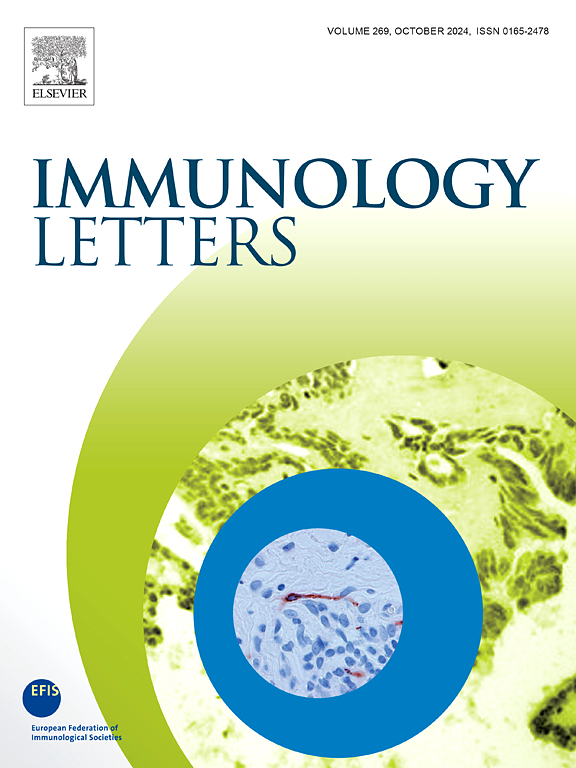血小板来源的微泡调节THP-1单核细胞和巨噬细胞的细胞因子和脂质介质谱
IF 2.8
4区 医学
Q3 IMMUNOLOGY
引用次数: 0
摘要
单核细胞是一种循环免疫细胞,它迁移到炎症组织并分化为巨噬细胞,在巨噬细胞中,它们通过细胞因子和脂质介质的分泌,在调节促炎和促溶反应中发挥双重作用。血小板源性微泡(platelet derived microvesicles, PMVs)在血小板活化过程中释放,浸润炎症区域并与单核细胞和巨噬细胞相互作用,促进生物活性物质的转移。虽然已经观察到这些相互作用,但它们对单核细胞/巨噬细胞炎症谱的功能影响仍然知之甚少。在这项研究中,pmv被人类THP-1单核细胞内化。与THP-1细胞的相互作用发生迅速,60%的细胞在1小时内与pmv相互作用。当细胞分化为M0和M1巨噬细胞时,与PMVs的相互作用仅在24小时后达到峰值。细胞与PMVs的相互作用导致合成环加氧酶和脂加氧酶衍生的炎症脂质介质的能力增加,尤其是在M1细胞中。细胞因子的产生也以细胞状态依赖的方式受到影响。PMVs对未分化的THP-1细胞没有影响,但增强了M0细胞中几种细胞因子的产生以及M1巨噬细胞中IL-23和IL-6的产生。当受到脂多糖刺激时,pmv处理的M0巨噬细胞显示出抗炎细胞因子IL-10的产生增加,而M1巨噬细胞显示出IL-1β, MCP-1和IL-6的分泌增加,突出了促炎细胞因子的产生。这些发现表明,pmv选择性地调节单核细胞和巨噬细胞的炎症细胞因子和脂质介质谱,这取决于它们的分化状态。这项研究强调了pmv在细胞间通讯和免疫调节中的关键作用,特别是在炎症的背景下。本文章由计算机程序翻译,如有差异,请以英文原文为准。
Platelet-derived microvesicles modulate cytokine and lipid mediator profiles in THP-1 monocytes and macrophages
Monocytes are circulating immune cells that migrate to inflamed tissues and differentiate into macrophages, where they play a dual role in regulating pro-inflammatory and pro-resolving responses through cytokine and lipid mediator secretion. Platelet-derived microvesicles (PMVs), released during platelet activation, infiltrate inflamed areas and interact with monocytes and macrophages, facilitating the transfer of bioactive contents. While these interactions have been observed, their functional consequences on monocyte/macrophage inflammatory profiles remain poorly understood. In this study, PMVs are shown to be internalized by human THP-1 monocytes. The interaction with THP-1 cells occurs rapidly, with 60 % of cells interacting with PMVs within one hour. When cells are differentiated to M0 and M1 macrophages, interactions with PMVs only peak after 24 h. Interaction of cells with PMVs resulted in an increased capacity to synthesize cyclooxygenase- and lipoxygenase-derived lipid mediators of inflammation, especially in M1 cells. Cytokine production was also influenced in a cell-state-dependent manner. PMVs had no impact on undifferentiated THP-1 cells but enhanced the production of several cytokines in M0 cells as well as IL-23 and IL-6 in M1 macrophages. When stimulated with lipopolysaccharides, PMV-treated M0 macrophages demonstrated elevated production of the anti-inflammatory cytokine IL-10, while M1 macrophages exhibited increased secretion of IL-1β, MCP-1, and IL-6, highlighting an effect on pro-inflammatory cytokine production. These findings reveal that PMVs selectively modulate the inflammatory cytokine and lipid mediator profiles of monocytes and macrophages depending on their differentiation state. This study underscores the role of PMVs as key players in intercellular communication and immune regulation, particularly in the context of inflammation.
求助全文
通过发布文献求助,成功后即可免费获取论文全文。
去求助
来源期刊

Immunology letters
医学-免疫学
CiteScore
7.60
自引率
0.00%
发文量
86
审稿时长
44 days
期刊介绍:
Immunology Letters provides a vehicle for the speedy publication of experimental papers, (mini)Reviews and Letters to the Editor addressing all aspects of molecular and cellular immunology. The essential criteria for publication will be clarity, experimental soundness and novelty. Results contradictory to current accepted thinking or ideas divergent from actual dogmas will be considered for publication provided that they are based on solid experimental findings.
Preference will be given to papers of immediate importance to other investigators, either by their experimental data, new ideas or new methodology. Scientific correspondence to the Editor-in-Chief related to the published papers may also be accepted provided that they are short and scientifically relevant to the papers mentioned, in order to provide a continuing forum for discussion.
 求助内容:
求助内容: 应助结果提醒方式:
应助结果提醒方式:


